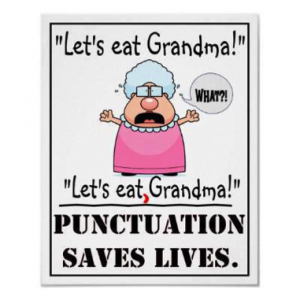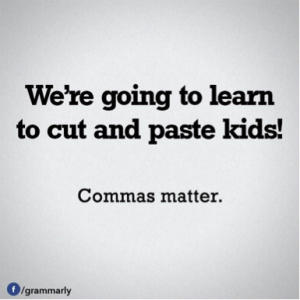By Amanda Toth
One factor that separates me from my dog is language.
What makes us human is our ability to communicate with each other through symbols. Written language requires rules for us to follow to effectively communicate with another.
Grammar lays the groundwork of effective communication. Would you build a house without a proper foundation? Grammar can alter the meaning and clarity of our message. Even some of the most popular books like The DaVinci Code or The Hunger Games are riddled with errors.
Here are some reasons why grammar matters:
- Meaning and Clarity. Forgetting a comma can cause some grave complications.
“Let’s eat Grandma!” and “Let’s eat, Grandma!” are two completely  different sentences. The first implies that we actually going to eat grandma; the latter implies we are telling Grandma the food is ready to eat.
different sentences. The first implies that we actually going to eat grandma; the latter implies we are telling Grandma the food is ready to eat.
One tiny comma can change the meaning of this sentence. Neil Patel has written a great post on how to clarify your message that goes beyond grammar.
- Credibility. Proper grammar gives you credibility.
An effectively written e-mail gives you respect. Imagine the CEO of your company using the word their instead of there. 15 Common Grammar Mistakes That Kill Your Writing Credibility is great guide on how to clean your writing.
- Time Saver. Good grammer is a time saver, and can really help u save time cause it helps to clarify ur massage without youre reader having to go back, and forth, to try and figure out what you say when what you are saying can be fixed by grammar.
In short, good grammar saves you time. Your reader should not be working to decipher your message. Websites like Grammarly can help you fix your sentences but do cost money.
- Competitive Edge. Let’s say you are manager of a consulting firm. You have one open position for an entry-level consultant. You have sixty resumes that came in the last few days. You’re overwhelmed and need to start weeding some out. Would you choose to keep the resumes that are poorly written?
Applicant 1 writes in his cover letter, “I am the perfect fit for this job. At XYZ Consulting, I interned on there consulting team for a major project than we increased the companys’ profits by 10%.”
Applicant 2 writes, “I am the perfect fit for this job. At XYZ Consulting, I interned on their consulting team. We acquired a major corporation for a project. We then increased the company’s profit by 10%.”
 As a manager hiring someone to represent your company, you would gravitate towards an effective writer. Based on the above example, Applicant 2 would be the best choice. The Important of Grammar in Business Communication has other great reasons why grammar is important.
As a manager hiring someone to represent your company, you would gravitate towards an effective writer. Based on the above example, Applicant 2 would be the best choice. The Important of Grammar in Business Communication has other great reasons why grammar is important.
In all, please don’t eat Grandma or cut and paste children.
Commas do matter. Sentence structure matters. Proofreading matters too.
Whether you are writing for school, for work, or for a blog, grammar must always be taken into consideration. What you need to say is important! Why not make sure your reader understands your message?
